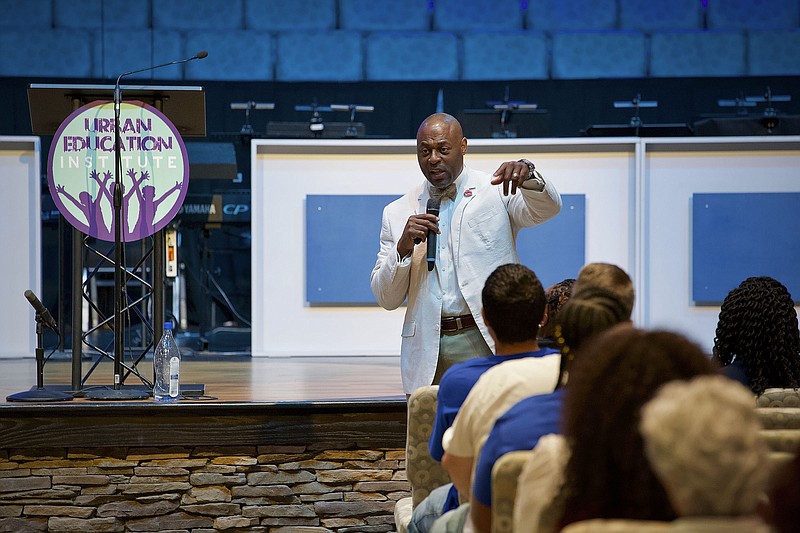Does the color of a person's skin affect how they do on a test or whether or not they get detention? Do some people have it easier when dealing with law enforcement or are some people able to discriminate more than others?
These were some of the topics recently discussed during a professional development session for some Hamilton County Schools teachers.
A presentation by motivational speaker, author and former NFL football player Robert Jackson focused on implicit, or unconscious, biases and how bias could affect a teacher's classroom. The presentation was one of several sessions that broached a range of topics, including classroom management, dealing with trauma and more, according to district officials.
Some said the topics were inappropriate and that taxpayer dollars should not be used for such trainings; others have defended the need for conversations about race and equity, especially for teachers who work in the district's Opportunity Zone, which includes its 12 lowest-performing schools that have large populations of students of color.
Patrick Hampton, vice president of communications and community engagement and Hamilton Flourishing, a local conservative political organization, first posted on Facebook about the slides.
In his post, Hampton said, "This is what Hamilton County employees and teachers had to sit through. This is called professional development. The liberal left is running the school systems and pushing their agenda onto our children with our tax dollars. #GetOut."
School board member Rhonda Thurman, of District 1, said the district should be ashamed of itself for holding such a training.
"This has done nothing but create division among faculty and division among schools. " Thurman said. "If the administrator really wanted to do something to address the problems in the school system, they should have a [professional development] on drugs, gangs and lack of leadership in their communities."
Thurman is also worried that teachers who felt uncomfortable or did not approve of the training are unwilling to speak out. The Times Free Press was unable to find such a teacher to speak on the record.
"They don't want to be ostracized by their colleagues and by the administrators," Thurman said.
But board member Tiffanie Robinson, of District 4, represents several Opportunity Zone schools and said teachers are striving to understand their students.
"Our teachers want to know and understand their students. Many of our teachers, fortunately, did not grow up in the environments our students are coming from. Understanding their home life and community helps our teachers better understand how to build relationships with their students and thus better instruct them toward success," Robinson said.
Kessler Cuffman, a teacher at East Lake Academy, was at the Urban Education Institute on Aug. 2. The institute was an in-service training day solely for Opportunity Zone teachers. He's attended all three that the district has hosted since August 2018, which have featured local leaders like Troy Kemp, Edna Varner and Joe Hunter, as well as nationally known education leaders, including former U.S. Education Secretary John King.
He said he was surprised by the controversy that swelled in the community after Jackson's presentation.
"Robert Jackson is a fantastic speaker. I really like what he has to say," Cuffman said. "He motivates you, he challenges you, he really makes you think that regardless of all the circumstances, you take the students where they are at but you never let them use [anything] as an excuse. I think what is challenging for some people is when they hear there are types of privilege, they feel like its dismissing their circumstances or their experiences. Some of it was meant to spur conversation, I don't look at it as they are dismissing any struggles you've ever had."
Cuffman is white. He's lived in Chattanooga for more than a decade since moving here to attend Lee University, and he said he identifies with some of his students who are growing up in low-income families.
But not all educators share similar backgrounds to their students.
Nationally, more than 80% of teachers are white and the majority are female. In Hamilton County, 85% of teachers were white and only 8.8% were black during the 2016-17 school year, according to the Tennessee Department of Education.
But more than 44% of students in Hamilton County are students of color, and most Opportunity Zone schools have student populations where more than 90% of the student body are students of color.
Tanji Marshall Reed, of the Education Trust - a national nonprofit education organization focused on closing gaps and disparities in education - said students of color can sometimes be uncomfortable in the classroom.
Data released in 2018 by the National Center for Education Statistics showed that an achievement gap persists nationally - and statewide - between children of color, poor children, children who don't speak English as their first language, and their white, wealthier peers.
Hamilton County Schools itself was flagged last year by the state of Tennessee for disproportionately disciplining black students, especially those with disabilities.
Reed said school districts need to look at their data and teachers need to talk about disparities especially when it comes to race.
"If the kids are uncomfortable, and kids are, it's because teachers are living breathing, walking and teaching out of their bias and their underlying racist biases," Reed said.
Research shows that white teachers discipline students of color more than white students. Research also shows that teachers of color are more likely to recommend students of color for advanced courses or programs than white teachers and are less likely to discipline students of color. A 2017 study by John Hopkins University, found that black students with at least one teacher of color were 29% less likely to drop out of school.
Educators need to talk about this, Reed said. And when they do, it will change the way they teach.
"I think they are more conscious about the work they do, they are more conscious about their assignments, about how they approach their students, what they think and what they do," she said.
Catherine Casselman is a second grade teacher at East Side Elementary. The school isn't in the Opportunity Zone, but its demographics mirror the Opportunity Zone's schools - 96% of its students are students of color and 72% are economically disadvantaged. She wishes she had access to trainings like the Urban Education Institute.
"I think these trainings are necessary because white teachers don't understand their positions of power in the classroom," she said. "I think it's really necessary."
Casselman said she feels like she and other teachers sometimes might not understand the cultural context of certain student behaviors like speaking out of turn or not making eye contact.
She is a graduate of the Project Inspire teaching residency through the Public Education Foundation and Lee University, which has also come under fire for its curriculum that heavily focuses on dynamics of race and privilege, and said she wants to continue having these conversations.
"Last year, I felt kind of disconnected from that type of learning" Casselman said of her first year teaching during the 2018-19 school year. "Race and grappling with being a white teacher [teaching minority children], a lot of that is sort of easy to push aside when dealing with the day-to-day."
Hamilton County Schools officials say that professional development and in-service training offerings differ between schools and across grade levels and content areas. Some trainings are mandatory and some are optional.
At previous Urban Education Institutes and even at this year's, teachers were able to choose some of the breakout sessions they attended. Content leads, principals and others will often have a hand in planning different professional development opportunities. The Opportunity Zone's senior leadership team all had a hand in planning this year's Urban Education Institute, district officials said.
Justin Robertson, chief of schools for the district, said the goal of a lot of training this summer was to address achievement or opportunity gaps among certain populations or groups of students.
"Historically, our data shows that many of our students are leaving school unprepared, including our minority students and students with disabilities," Robertson said in a statement. "Professional development across the district this summer has focused on ensuring we have high expectations for all students and that all students have access to quality instruction with assignments and resources that are on grade level."
Gini Pupo-Walker, senior director of education policy and programs for Tennessee nonprofit, Conexion Americas, and a school board member for Metro Nashville Public Schools, said educators' expectations of their students has a huge impact on student achievement.
"We know that teachers are the single most important factor for students in school success. Teacher expectations are one of the greatest predictors for student success in post-secondary enrollment," she said. "If a teacher believes that students can excel at very high levels, then they do. Of course, there is bias in every individual regardless of race and gender, and certainly there is also bias around race and not inclusive to just white teachers in general."
This is why implicit bias trainings like Jackson's are important, Pupo-Walker said. But she acknowledges they can be hard, especially if a community isn't ready for it.
"These are extremely difficult conversations. It has to be done so carefully," she said. "It has to be done in smaller groups where there is trust, smaller groups with people who may know each other. And when it's not done well, it can be just a setback for the conversations and certainly that's not what the intent of the conversation [is]."
She pointed out that the data shows that Hamilton County has achievement gaps, but just like other communities in Tennessee, it might be hard to have conversations about race, segregated schools and historically failing schools.
In 2018, the local NAACP urged Hamilton County Schools to contract with a consulting group to conduct culturally responsive training for some of the district's schools, which prompted the creation of the district's Equity Task Force.
Though the task force has not met regularly since its creation, district leaders have said equity continues to be a focus for the district.
Since Jackson's presentation on Aug. 2, school board members and the Times Free Press requested copies of his presentation. Tim Hensley, spokesman for the district, said in an email that the district and board members do not have a copy of the presentation.
"The presentation is the intellectual property of the presenter and he did not leave a copy after the presentation on Friday," Hensley said.
The district's attorney, Scott Bennett, has been working with Jackson to potentially obtain a copy of the presentation. According to school board members, Jackson has not been paid yet for his appearance.
Jackson has not commented on the controversy stirred after his appearance, but he did post on Twitter on Aug. 7 with a picture of the event.
"Those who want to receive your message will," he said. "Others only look for holes to stir in. Miserable people. Our students lives are dependent on it! I won't stop!"
Commissioner Tim Boyd, of District 8, also called on Johnson to appear before the Hamilton County Commission on Aug. 7 to answer questions about the presentation, but Johnson did not appear.
Johnson said his focus was on the first day of school. He has declined to comment on Jackson's presentation.
Thurman said she absolutely thinks Johnson should say something.
"This is indefensible. If [Johnson] didn't know about it, that's a problem, and if he did know about it and didn't object to it, then that's a problem," Thurman said. "This did not do one thing to promote the academic success of one student. All it did was create a major problem for us to deal with and we have enough problems."
Contact Meghan Mangrum at mmangrum@timesfreepress.com or 423-757- 6592. Follow her on Twitter @memangrum.

